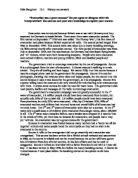“Women over 30 gained the right to vote in 1918 mainly because of Women’s contribution to the War Effort.” Do you agree with this Statement? Explain your answer fully
After 1914, women stopped protesting for the vote, but for the Right to Serve. Women wanted to gain the right to help the country during wartime. They found it more important to be patriotic rather than to win the vote. Although this was the matter, the men would not let the women work! Many girl’s brothers, fathers, husbands or sons would go out to war, and they would too like to help out a bit. MP’s proclaimed women were only fit to “dress up and play the piano!”
Although, this changed in 1915 due to two reasons, firstly, too many munitions workers in factories had been allowed to fight instead of stay home and work, so therefore, not enough munitions were being produced. Each day, there was a rationing of shells on the Western Front, whereas the opposition were firing away, pounding at the front lines non-stop. Secondly, in July, a great number of Suffragettes gathered at Whitehall and led a huge demonstration protesting for the right to serve. By the time, the munitions problem was worse, so the Suffragettes were greeted with cries of splendour! Lloyd George, who was the man to blame for the munitions problem, had jumped to this chance and immediately employed women to work in factories. Gradually, other factories employed women too.







